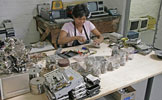
HP, together with the Global Digital Solidarity Fund (DSF) and the Swiss Federal Laboratories for Materials Testing and Research (Empa), have unveiled the first results of a pilot
project, based in Cape Town, to tackle the problem of electronic waste (e-waste) in Africa.
“The results have been encouraging. Approximately 60 tonnes of electronic equipment was processed at the facility, generating an income of around R126 000 from February to November 2008, and created direct employment for 19 people,” says Dr Kirstie McIntyre, Environmental Compliance, Environmental Business Management Organisation, HP EMEA.

This initiative was carried out in South Africa, Morocco and Kenya and has gathered vital information on how African governments, organisations and society are dealing with the rising problem of e-waste management, as well as to test solutions on the way forward. These results will support the launch of the second phase, which aims at engaging corporate and government partners to further extend e-waste management programmes to other countries and tackle the problem of e-waste on the entire continent.
Dr McIntyre adds, “The second phase of the project also seeks to incorporate informal processing activities that can prove highly effective in dealing with waste, by transforming them into sustainable and environmentally sound operations.”
“The research has shown that a solution is at hand and demonstrated some of the incredible entrepreneurial skills we can tap into in the informal sector in Africa,” said project manager and Empa researcher Mathias Schluep. “By providing tools and training, we have removed potential environmental and health problems that can be caused by handling e-waste incorrectly. What is more, we have created a channel to full employment for creative minds in the informal sector.”
The assessment studies conducted in Morocco and Kenya provided a clear picture of the e-waste management landscape in those countries, particularly on the legislation in place, local awareness and behaviour, infrastructural needs and total amount of waste generated. For example, the study in Kenya has demonstrated that although the country is producing 3000 tonnes of e-waste per year, with an increase of 200% per year, there is a clear lack of legislative framework and practical e-waste management systems. To address this, the study recommends that a mechanism to raise funds for the expensive processing of e-waste is established, and measures to raise public awareness are taken.
“Information technology represents a real opportunity to boost the African economy, but the question that must be addressed is what we do with outdated equipment,” said Cisse Kane from DSF. “This project has helped us close the loop by providing a model for safe and efficient treatment and disposal of e-waste.”
The findings and recommendations that resulted from these studies will now be considered in the second phase, which aims to assess sustainable business models in electronic waste recycling and deploy medium to large infrastructure pilots in these and other countries.

© Technews Publishing (Pty) Ltd | All Rights Reserved